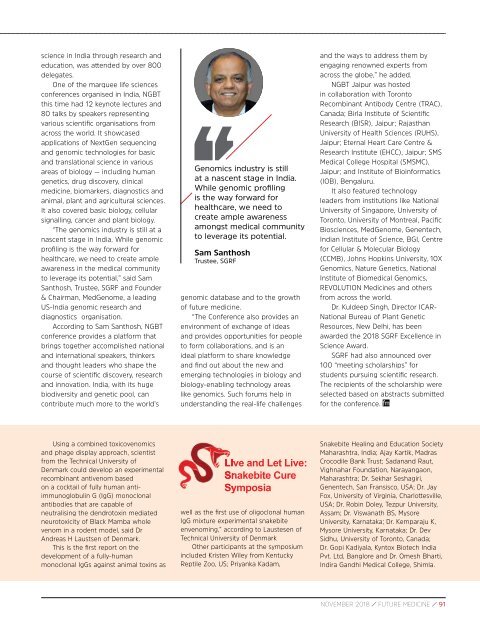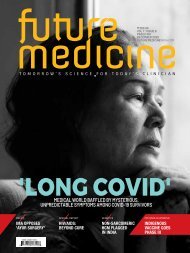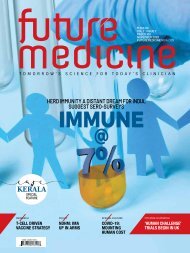Create successful ePaper yourself
Turn your PDF publications into a flip-book with our unique Google optimized e-Paper software.
science in India through research and<br />
education, was attended by over 800<br />
delegates.<br />
One of the marquee life sciences<br />
conferences organised in India, NGBT<br />
this time had 12 keynote lectures and<br />
80 talks by speakers representing<br />
various scientific organisations from<br />
across the world. It showcased<br />
applications of NextGen sequencing<br />
and genomic technologies for basic<br />
and translational science in various<br />
areas of biology — including human<br />
genetics, drug discovery, clinical<br />
medicine, biomarkers, diagnostics and<br />
animal, plant and agricultural sciences.<br />
It also covered basic biology, cellular<br />
signalling, cancer and plant biology.<br />
“The genomics industry is still at a<br />
nascent stage in India. While genomic<br />
profiling is the way forward for<br />
healthcare, we need to create ample<br />
awareness in the medical community<br />
to leverage its potential,” said Sam<br />
Santhosh, Trustee, SGRF and Founder<br />
& Chairman, MedGenome, a leading<br />
US-India genomic research and<br />
diagnostics organisation.<br />
According to Sam Santhosh, NGBT<br />
conference provides a platform that<br />
brings together accomplished national<br />
and international speakers, thinkers<br />
and thought leaders who shape the<br />
course of scientific discovery, research<br />
and innovation. India, with its huge<br />
biodiversity and genetic pool, can<br />
contribute much more to the world’s<br />
Genomics industry is still<br />
at a nascent stage in India.<br />
While genomic profiling<br />
is the way forward for<br />
healthcare, we need to<br />
create ample awareness<br />
amongst medical community<br />
to leverage its potential.<br />
Sam Santhosh<br />
Trustee, SGRF<br />
genomic database and to the growth<br />
of future medicine.<br />
“The Conference also provides an<br />
environment of exchange of ideas<br />
and provides opportunities for people<br />
to form collaborations, and is an<br />
ideal platform to share knowledge<br />
and find out about the new and<br />
emerging technologies in biology and<br />
biology-enabling technology areas<br />
like genomics. Such forums help in<br />
understanding the real-life challenges<br />
and the ways to address them by<br />
engaging renowned experts from<br />
across the globe,” he added.<br />
NGBT Jaipur was hosted<br />
in collaboration with Toronto<br />
Recombinant Antibody Centre (TRAC),<br />
Canada; Birla Institute of Scientific<br />
Research (BISR), Jaipur; Rajasthan<br />
University of Health Sciences (RUHS),<br />
Jaipur; Eternal Heart Care Centre &<br />
Research Institute (EHCC), Jaipur; SMS<br />
Medical College Hospital (SMSMC),<br />
Jaipur; and Institute of Bioinformatics<br />
(IOB), Bengaluru.<br />
It also featured technology<br />
leaders from institutions like National<br />
University of Singapore, University of<br />
Toronto, University of Montreal, Pacific<br />
Biosciences, MedGenome, Genentech,<br />
Indian Institute of Science, BGI, Centre<br />
for Cellular & Molecular Biology<br />
(CCMB), Johns Hopkins University, 10X<br />
Genomics, Nature Genetics, National<br />
Institute of Biomedical Genomics,<br />
REVOLUTION Medicines and others<br />
from across the world.<br />
Dr. Kuldeep Singh, Director ICAR-<br />
National Bureau of Plant Genetic<br />
Resources, New Delhi, has been<br />
awarded the <strong>2018</strong> SGRF Excellence in<br />
Science Award.<br />
SGRF had also announced over<br />
100 “meeting scholarships” for<br />
students pursuing scientific research.<br />
The recipients of the scholarship were<br />
selected based on abstracts submitted<br />
for the conference.<br />
Using a combined toxicovenomics<br />
and phage display approach, scientist<br />
from the Technical University of<br />
Denmark could develop an experimental<br />
recombinant antivenom based<br />
on a cocktail of fully human antiimmunoglobulin<br />
G (IgG) monoclonal<br />
antibodies that are capable of<br />
neutralising the dendrotoxin mediated<br />
neurotoxicity of Black Mamba whole<br />
venom in a rodent model, said Dr<br />
Andreas H Laustsen of Denmark.<br />
This is the first report on the<br />
development of a fully-human<br />
monoclonal IgGs against animal toxins as<br />
well as the first use of oligoclonal human<br />
IgG mixture experimental snakebite<br />
envenoming,” according to Laustesen of<br />
Technical University of Denmark<br />
Other participants at the symposium<br />
included Kristen Wiley from Kentucky<br />
Reptile Zoo, US; Priyanka Kadam,<br />
Snakebite Healing and Education Society<br />
Maharashtra, India; Ajay Kartik, Madras<br />
Crocodile Bank Trust; Sadanand Raut,<br />
Vighnahar Foundation, Narayangaon,<br />
Maharashtra; Dr. Sekhar Seshagiri,<br />
Genentech, San Fransisco, USA; Dr. Jay<br />
Fox, University of Virginia, Charlottesville,<br />
USA; Dr. Robin Doley, Tezpur University,<br />
Assam; Dr. Viswanath BS, Mysore<br />
University, Karnataka; Dr. Kemparaju K,<br />
Mysore University, Karnataka; Dr. Dev<br />
Sidhu, University of Toronto, Canada;<br />
Dr. Gopi Kadiyala, Kyntox Biotech India<br />
Pvt. Ltd, Banglore and Dr. Omesh Bharti,<br />
Indira Gandhi Medical College, Shimla.<br />
<strong>NOVEMBER</strong> <strong>2018</strong> / FUTURE MEDICINE / 91


















